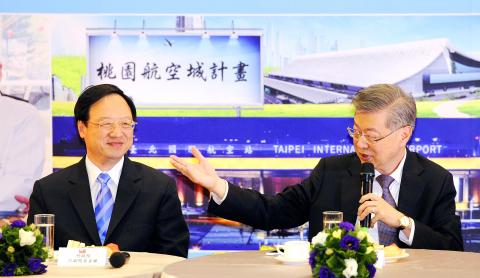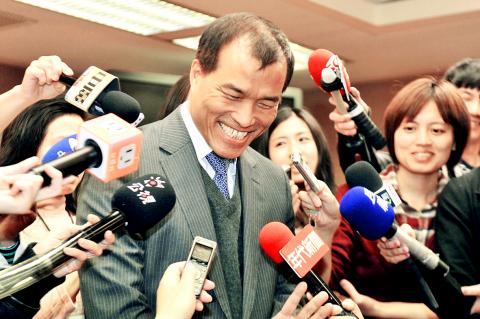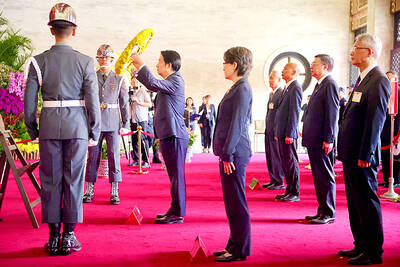Vice Premier Jiang Yi-huah (江宜樺) will replace Premier Sean Chen (陳冲), who has resigned because of health reasons, the Presidential Office said in a statement issued late on Thursday evening.
The statement, issued at about 11:30pm, said Chen had offered to resign on several occasions because of poor health, but that President Ma Ying-jeou (馬英九) only approved the resignation this week.
The statement came after the Chinese Television System (CTS) reported earlier that evening that Jiang was to replace Chen as premier, while Minister of Transportation and Communications Mao Chi-kuo (毛治國) would succeed Jiang as vice premier.

Photo: George Tsorng, Taipei Times
The Presidential Office statement lauded Chen for his expertise and leadership in implementing government policies — from fuel price changes to pension reforms — and working with the president to promote social justice. It said that Ma’s decision to appoint Jiang and Mao was made after careful consideration and consultation with various authorities.
Chen told a year-end Cabinet press conference yesterday that he resigned to “reverse my health condition” after a recent health examination made him “worried about [his] health.”
Chen said the president was originally scheduled to unveil the Cabinet reshuffle next week, but that a media leak prompted Ma to call an impromptu meeting with him, Jiang and Mao late last night at the president’s residence, which was followed by the midnight announcement of the changes.

Photo: Chen Chih-chu, Taipei Times
He dismissed media reports that he had been “shocked” at the announcement.
Chen said Ma accepted his resignation on Monday, when the president spoke to him by telephone. He said he first talked of his intent to step down on Jan. 16, which was followed by a written resignation letter to Ma on Jan. 23.
Chen said he had been experiencing chest pains since the beginning of the year and had a cardiac CT scan and other health tests on Jan. 15.
“The findings worried me a bit,” he said.
After listening to the doctor’s explanation of the test results and doing some medical research, Chen said he realized he would not be able to reverse his health condition unless he made substantial changes to his work and lifestyle.
The following day, he asked the president to look for his replacement and submitted his written resignation on Jan. 23, explaining in detail his reason for leaving.
Chen said he told Ma in the letter that he is willing to make sacrifices for the nation, but “it would be an unbearable and irreversible burden” for him if national interests were compromised because of his health problems.
During a telephone conversation, the president told him that after giving the matter long consideration, he decided to accept the resignation and would designate Jiang as premier.
Chen also denied earlier media rumors that he was being considered to succeed central bank Governor Perng Fai-nan (彭淮南), whose third term of office expires on Feb. 25.
At a separate setting, Jiang said he had agreed on Sunday to assume the premiership, when Ma called him to a meeting that night and told him that Chen was resolute about resigning because of health reasons.
“President [Ma] said he did not have the heart to persuade Premier Chen to stay on because that could be harmful to his health,” Jiang said.
Jiang said that Ma began asking him if he was willing to take over as premier sometime in the second half of last month, and that he told the president either to try to retain Chen if his health permits or to consider other candidates who are more capable.
Praising Chen for his achievements during his one-year tenure, Jiang said he could never do a better job than Chen, but he eventually agreed to shoulder the responsibility because Chen “needs to have a good rest” to recover.
“I am willing to undertake the task to move the [nation] forward and create a better future,” he said.
The latest Cabinet reshuffle has consolidated Jiang’s political strength within the KMT and sparked heated discussion about an internal power struggle among potential top contenders for the party’s presidential nomination in 2016 — including Vice President Wu Den-yih (吳敦義), Taipei Mayor Hau Lung-bin (郝龍斌) and New Taipei City (新北市) Mayor Eric Chu (朱立倫).
Chu congratulated Jiang and praised him for his capabilities and profound knowledge on various issues, saying he expected Jiang to handle national affairs well.
Hau also lauded Jiang for his communication and execution skills, and said the new Cabinet should strengthen its efforts to promote fiscal and economic policies because reviving the nation’s economy is the government’s priority.
He declined to comment when asked about potential plans to run in the 2016 presidential race, stressing the importance of party unity.
Democratic Progressive Party Chairman Su Tseng-chang (蘇貞昌) criticized the Presidential Office’s late-night announcement of the changes as “ridiculous,” while former president Lee Teng-hui (李登輝) said it was not appropriate, adding that matters of such scope should have been announced in daytime.
A number of pan-blue lawmakers said the Cabinet reshuffle was pointless if officials in charge of economic affairs were not replaced, while pan-green lawmakers said Jiang’s appointment once again showed that Ma only picks people from his small circle of confidantes.
The Executive Yuan also announced that Vice Minister of Transportation and Communications Yeh Kuang-shih (葉匡時) would succeed Mao, and that Taipei Deputy Mayor Chen Wei-jen (陳威仁) would be the new Cabinet secretary-general, replacing Steven Chen (陳士魁), who would become a minister without portfolio.
Perng will be reappointed for a fourth five-year term as central bank chief, sources said.
The handover ceremony for the premier will likely take place on Thursday, the sources added.
Additional reporting by Rich Chang and staff writer

RESPONSE: The transit sends a message that China’s alignment with other countries would not deter the West from defending freedom of navigation, an academic said Canadian frigate the Ville de Quebec and Australian guided-missile destroyer the Brisbane transited the Taiwan Strait yesterday morning, the first time the two nations have conducted a joint freedom of navigation operation. The Canadian and Australian militaries did not immediately respond to requests for comment. The Ministry of National Defense declined to confirm the passage, saying only that Taiwan’s armed forces had deployed surveillance and reconnaissance assets, along with warships and combat aircraft, to safeguard security across the Strait. The two vessels were observed transiting northward along the eastern side of the Taiwan Strait’s median line, with Japan being their most likely destination,

‘NOT ALONE’: A Taiwan Strait war would disrupt global trade routes, and could spark a worldwide crisis, so a powerful US presence is needed as a deterrence, a US senator said US Senator Deb Fischer on Thursday urged her colleagues in the US Congress to deepen Washington’s cooperation with Taiwan and other Indo-Pacific partners to contain the global security threat from China. Fischer and other lawmakers recently returned from an official trip to the Indo-Pacific region, where they toured US military bases in Hawaii and Guam, and visited leaders, including President William Lai (賴清德). The trip underscored the reality that the world is undergoing turmoil, and maintaining a free and open Indo-Pacific region is crucial to the security interests of the US and its partners, she said. Her visit to Taiwan demonstrated ways the

GLOBAL ISSUE: If China annexes Taiwan, ‘it will not stop its expansion there, as it only becomes stronger and has more force to expand further,’ the president said China’s military and diplomatic expansion is not a sole issue for Taiwan, but one that risks world peace, President William Lai (賴清德) said yesterday, adding that Taiwan would stand with the alliance of democratic countries to preserve peace through deterrence. Lai made the remark in an exclusive interview with the Chinese-language Liberty Times (sister paper of the Taipei Times). “China is strategically pushing forward to change the international order,” Lai said, adding that China established the Asia Infrastructure Investment Bank, launched the Belt and Road Initiative, and pushed for yuan internationalization, because it wants to replace the democratic rules-based international

WAR’S END ANNIVERSARY: ‘Taiwan does not believe in commemorating peace by holding guns,’ the president said on social media after attending a morning ceremony Countries should uphold peace, and promote freedom and democracy, President William Lai (賴清德) said yesterday as Taiwan marked 80 years since the end of World War II and the Second Sino-Japanese War. Lai, Vice President Hsiao Bi-khim (蕭美琴) and other top officials in the morning attended a ceremony at the National Revolutionary Martyrs’ Shrine in Taipei’s Zhongshan District (中山) to honor those who sacrificed their lives in major battles. “Taiwanese are peace-loving. Taiwan does not believe in commemorating peace by holding guns,” Lai wrote on Facebook afterward, apparently to highlight the contrast with the military parade in Beijing marking the same anniversary. “We